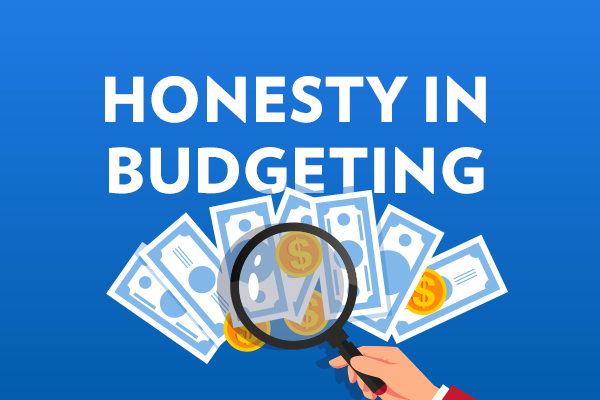Commentary

5 Takeaways from Governor Wolf’s 2020 Budget Address
Governor Wolf unveiled his sixth budget proposal today. Here are five key takeaways.
1. Spends Beyond the Taxpayer Protection Act Limit!
Wolf’s proposed General Fund Budget of $36.1 billion would increase spending by 6.1% over last year’s enacted budget. His overall spending plan—an $89.3 billion operating budget—represents an increase of 3%. These increases significantly exceed taxpayers’ ability to pay.
Instead, lawmakers should pass the Taxpayer Protect Act—House Bill 1316 sponsored by Rep. Ryan Warner and Senate Bill 116 sponsored by Sen. Camera Bartolotta. The Taxpayer Protection Act allows for sustainable growth in government spending by limiting budget increases to the average rate of inflation and population growth. Only a supermajority vote can authorize spending above that threshold.
Under the Taxpayer Protection Act cap, the General Fund Budget could grow by 2.1% this year, to $34.7 billion.
2. Continues Unaccountable Overspending
Wolf’s proposal includes $588 million in cost overruns in the current year budget. These are known as “supplemental appropriations” that the legislature is asked to approve after the fact. Last year, Wolf’s cost overruns reached $670 million. Routine cost overruns hide the true growth in spending, side-step lawmakers’ ability to prioritize spending, and add to Pennsylvania’s already high tax burden on working families.
Legislators need to take back control by adopting honest budgeting, including House Bill 1861 (Rep. Seth Grove) and Senate Bill 885 (Sen. Kristin Phillips-Hill) that would require supplemental spending to be voted on in a standalone bill.
Additional reforms to improve transparency and honest budgeting include House Bill 1988 (Rep. Grove) to consolidate 17 special funds into the General Fund, House Bill 1991 (Rep. Dawn Keefer) to prohibit the diversion of general government revenue into special funds, and House Bill 855 (Rep. Jim Struzzi) to maintain a balanced budget with regular updates throughout the year.
3. Mortgages Pennsylvania’s Future
Wolf’s budget proposal includes massive amounts of new borrowing, including $1.1 billion in bonds for school facilities. This comes after Wolf and the legislature authorized the Commonwealth Financing Authority to borrow $2.5 billion for school construction just a few years ago. And Wolf has once again called for $4.5 billion in new debt for his “Restore PA” proposal.
Unsurprisingly, Wolf proposes spending all those borrowed funds during his term in office, while our children will be paying off the debt with interest for the next 30 years.
Graph: True Cost of Restore PA
Including pension liabilities and state agencies, the commonwealth is already $121 billion in debt, or $9,000 per person. As a result of ever-accruing debt, the state’s bond rating was downgraded in 2014 and nearly downgraded again in 2017.
4. Sends More Money to School Districts, but Attacks School Choice
Once again, Wolf is proposing an increase in state support for public schools. This year’s proposed budget represents a $309 million increase for public schools, including $115 million for basic education and $25 million for special education.
Public school spending is at an all-time high, as state funding for public schools has increased $2.4 billion in the last five years. Pennsylvania spends about $3,900 more per student than the national average.
Graph: 2020-21 State Support of Public Schools
While Wolf wants more money for some schools, he proposes gutting schools of choice, denying educational opportunity for thousands of kids and taking choices away from parents.
For starters, Wolf is promising massive cuts to charter school funding—even though these schools already receive less per student than district schools. While Wolf points to the “cost” of charter schools, these schools only get funding when parents choose them.
In reality, if charter schools got the same amount of funding per-student as districts—which would be “fair” and “equitable”—they would receive $2.4 billion for the nearly 140,000 students enrolled. Instead, they receive just $1.8 billion. In other words, charter schools are saving school districts and taxpayers $600 million.
At the same time, Wolf has proposed no increase for tax credit scholarship programs—the Educational Improvement Tax Credit and Opportunity Scholarship Tax Credit—despite nearly 50,000 students on waiting lists for these scholarships. And last year, he vetoed a bill that would have eliminated this waiting list. Tax credit scholarships have saved taxpayers an estimated $3 to $5 billion since 2002.
While Wolf has stated that children’s education shouldn’t be determined by their zip code, his proposals would trap students in their assigned school district. While tens of thousands of low-income families are entering lotteries for charter school seats and lining up for scholarships, Wolf is suppressing the opportunities they deserve.
5. Rehashes Past Budgets
As he has unsuccessfully proposed in five previous budgets, Wolf is again pushing to increase the state mandated minimum wage and impose a natural gas extraction tax on top of the impact fee and business taxes the industry already pays.
Unfortunately, his administration ignores economic evidence that these policies kill jobs and raise prices, pretending instead that there are no negative impacts of higher taxes and wage mandates. These proposals are more political than practical—with an eye on November rather than June.
More significantly, Wolf ignores evidence that wages and incomes are rising because of a growing economy fueled by federal tax reform. To create more family-sustaining jobs and continue raising wages so that all Pennsylvanians can flourish, lawmakers should adopt spending restraint and tax reform.
Bonus: Positive Elements of Wolf’s Budget
- Wolf has proposed lowering the Corporate Net Income Tax rate, recognizing that Pennsylvania’s excessive corporate tax rate hinders our economic competitiveness. Unfortunately, he pairs this with combined reporting, a complicated and burdensome tax structure. Reducing the number of tax breaks and incentives for individual, politically chosen companies and lowering the tax rate on all business are better solutions.
- Wolf proposed using the Race Horse Development Fund to support college financial aid, rather than award prizes to Saudi billionaires. This is a revenue stream that should be brought into the General Fund, allowing lawmakers to prioritize spending and protect working families from tax increases.